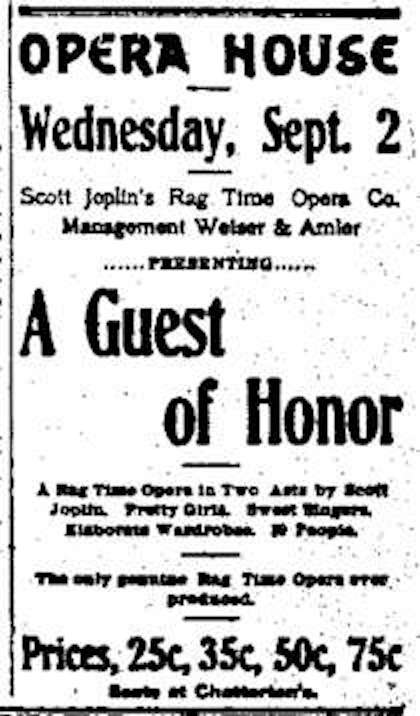A Guest of Honor (lost score to Scott Joplin opera; 1903): Difference between revisions
mNo edit summary |
mNo edit summary |
||
| Line 19: | Line 19: | ||
The score and music for the opera is completely lost, having never been published. Joplin filed a copyright application for the opera with the Library of Congress in 1903, but he did not include a copy of the score with the application. <ref>[https://www.jstor.org/stable/3051573?seq=1 Article discussing the copyright application, transmittal letter, and its circumstance of being lost] Retrieved 08 Feb '21</ref> The application also mentions that John Stark, Joplin's publisher at the time, would publish the music, but this never happened. | The score and music for the opera is completely lost, having never been published. Joplin filed a copyright application for the opera with the Library of Congress in 1903, but he did not include a copy of the score with the application. <ref>[https://www.jstor.org/stable/3051573?seq=1 Article discussing the copyright application, transmittal letter, and its circumstance of being lost] Retrieved 08 Feb '21</ref> The application also mentions that John Stark, Joplin's publisher at the time, would publish the music, but this never happened. | ||
In the following months, Joplin established a company to tour the opera across several Midwestern states. Early in the tour, a company associate stole the box office receipts, severely damaging their financial situation. The tour was abruptly aborted in Pittsburgh, Kansas, when Joplin could not afford the company's payroll and lodging. As a result, all of Joplin's belongings, including the opera score and possibly sheet music for other unknown | In the following months, Joplin established a company to tour the opera across several Midwestern states. Early in the tour, a company associate stole the box office receipts, severely damaging their financial situation. The tour was abruptly aborted in Pittsburgh, Kansas, when Joplin could not afford the company's payroll and lodging. As a result, all of Joplin's belongings, including the opera score and possibly sheet music for his other unknown compositions, were confiscated until Joplin could pay for the rent.<ref>[https://www.scottjoplin.org/joplin-biography.html Article by Joplin's leading biographer which touches on the story of A Guest Of Honor] Retrieved 08 Feb '21</ref> Joplin eventually left Pittsburgh without retrieving his belongings, which were supposedly left inside of a trunk. No copy of the score has ever resurfaced, and it is presumed to have been destroyed after its confiscation.<ref>[http://www.classical.net/music/comp.lst/joplin.php Scott Joplin biography] Retrieved 08 Feb '21</ref> | ||
==Gallery== | ==Gallery== | ||
Revision as of 15:01, 9 February 2021
"A Guest Of Honor" was an opera written by famous ragtime composer Scott Joplin. Written in 1903, this was the first opera he had ever composed.
Premise
The opera is believed to be a dramatization of African-American civil rights leader Booker T. Washington's 1901 White House dinner with President Theodore Roosevelt. This historic visit was met with condemnation from Roosevelt's political opponents, and mostly praise from the African-American community.
Availability
The score and music for the opera is completely lost, having never been published. Joplin filed a copyright application for the opera with the Library of Congress in 1903, but he did not include a copy of the score with the application. [1] The application also mentions that John Stark, Joplin's publisher at the time, would publish the music, but this never happened.
In the following months, Joplin established a company to tour the opera across several Midwestern states. Early in the tour, a company associate stole the box office receipts, severely damaging their financial situation. The tour was abruptly aborted in Pittsburgh, Kansas, when Joplin could not afford the company's payroll and lodging. As a result, all of Joplin's belongings, including the opera score and possibly sheet music for his other unknown compositions, were confiscated until Joplin could pay for the rent.[2] Joplin eventually left Pittsburgh without retrieving his belongings, which were supposedly left inside of a trunk. No copy of the score has ever resurfaced, and it is presumed to have been destroyed after its confiscation.[3]
Gallery
Reference
- ↑ Article discussing the copyright application, transmittal letter, and its circumstance of being lost Retrieved 08 Feb '21
- ↑ Article by Joplin's leading biographer which touches on the story of A Guest Of Honor Retrieved 08 Feb '21
- ↑ Scott Joplin biography Retrieved 08 Feb '21

